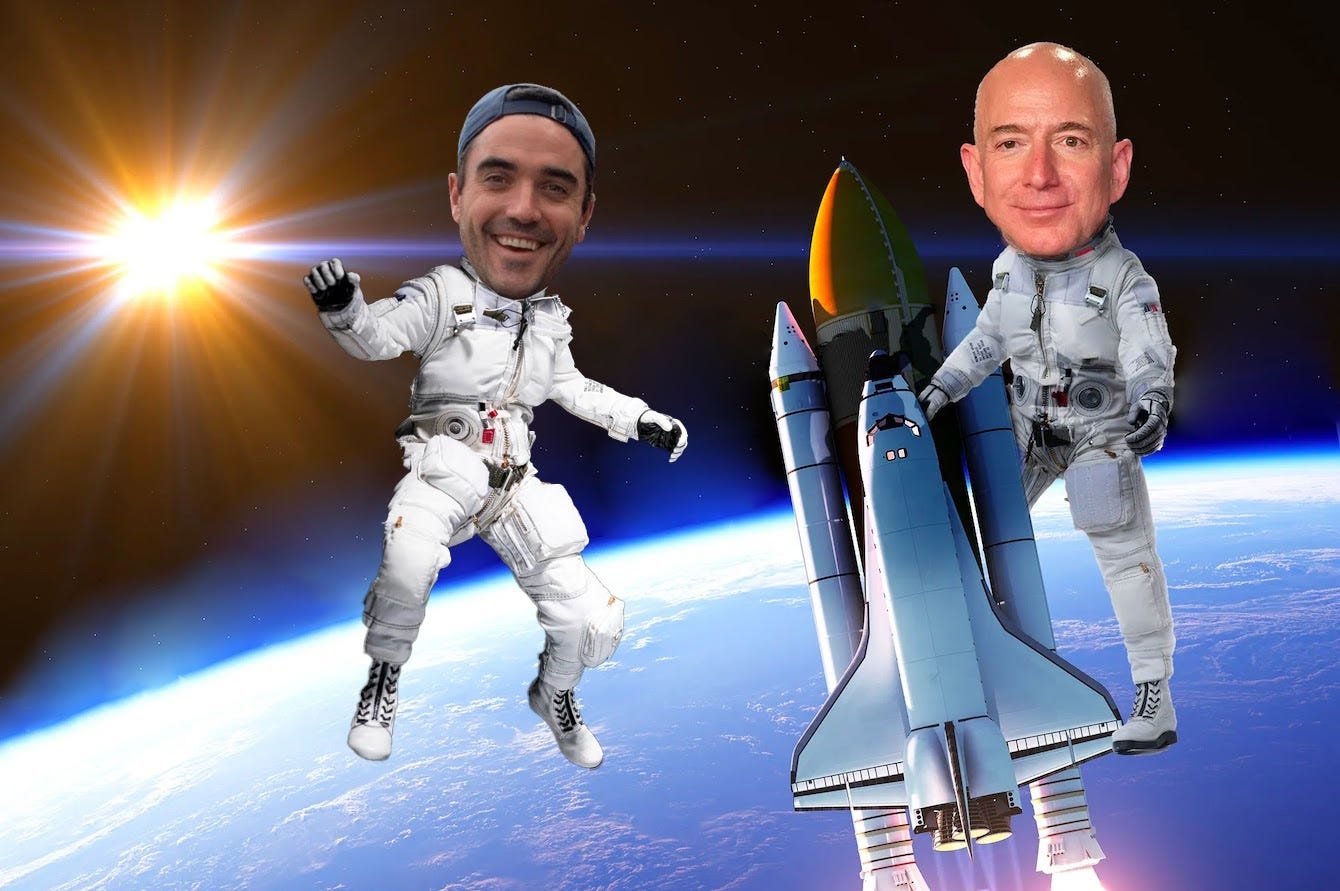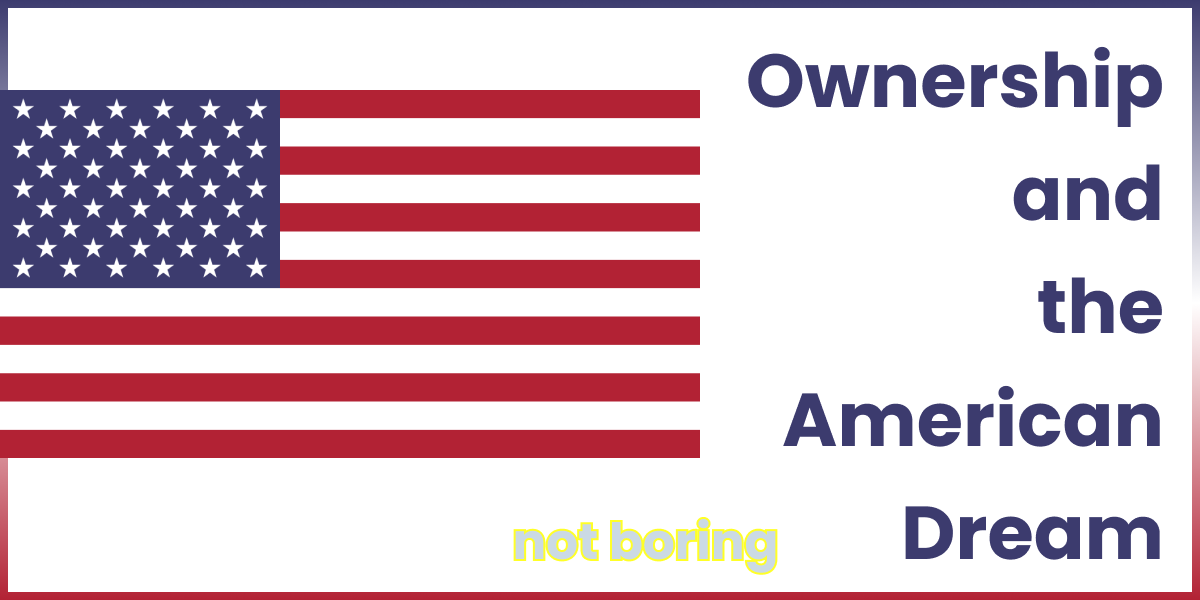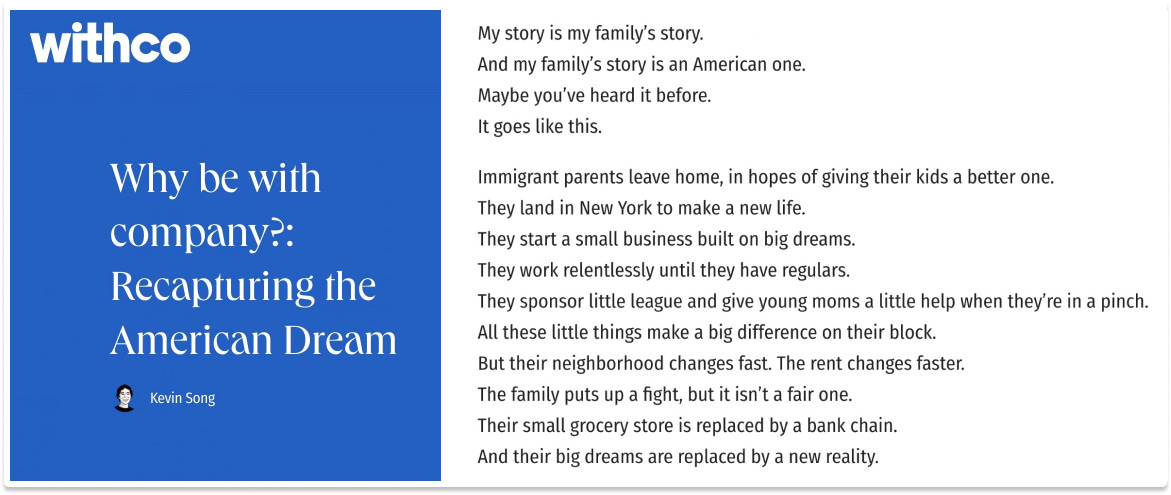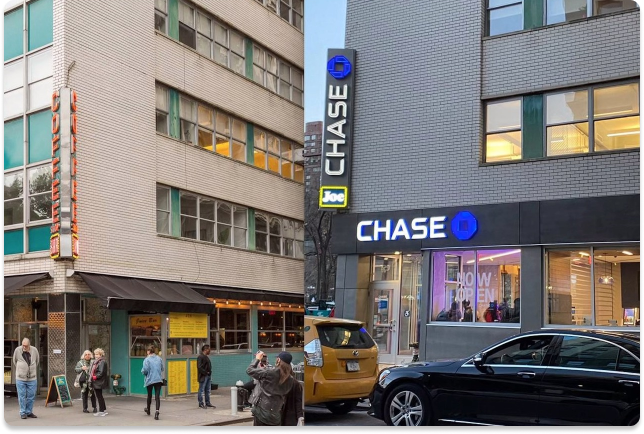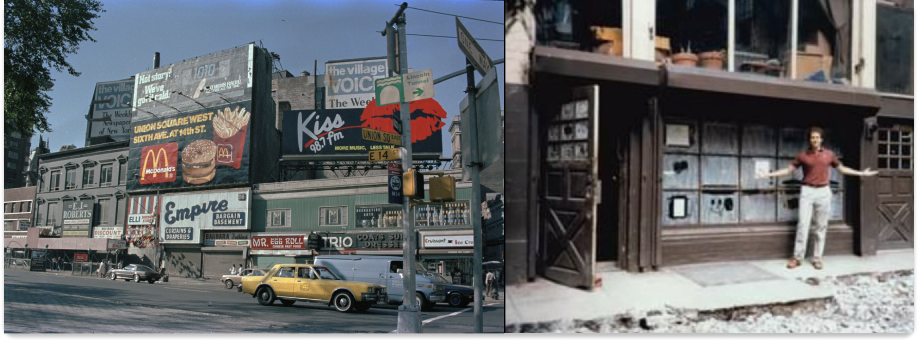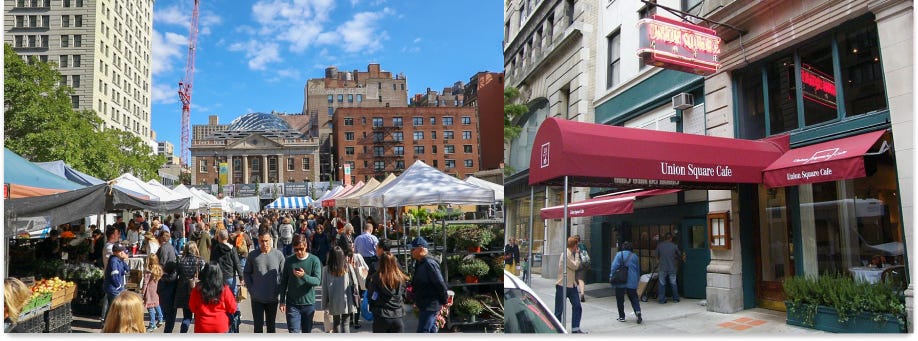Not Boring by Packy McCormick - Ownership and the American Dream
Welcome to the 860 newly Not Boring people who have joined us since last Monday! Join 104,159 smart, curious folks by subscribing here: 🎧 To get this essay straight in your ears: listen on Spotify or Apple Podcasts Today’s Not Boring is brought to you by… Masterworks It’s no secret I admire Jeff Bezos. How could I not? Son of an immigrant with a net worth of $180 billion, Jeff’s the American Dream personified. Over the last 20 years, Jeff’s set some huge trends: E-Commerce, Cloud services, Commercial Space Travel. Although I won't be riding with Jeff on a Blue Origin flight anytime soon, I am joining him on another venture, investing in art. Not many people realize Jeff’s a big art guy. Recently, he bought a painting called Vinette 19 for $18.5 million and then purchased a work by Ed Ruscha for a record $52.5 million at Christie's. And that’s only the art we know about. Here are a few possible reasons why more whales like Jeff are buying art:
But Jeff messed up. He paid $70M for two paintings. On the other hand, I have 11 paintings in my portfolio and spent a fraction of that, thanks to Masterworks. This is why I can’t stop talking about this platform. I can literally invest in the same art as Jeff Bezos in minutes. And I’m not the only one who believes in Masterworks. Over 330,000 people have signed up and they’ve got over $400 million in AUM. If you want to blast off into the art investing universe and join me on Masterworks— click my unique Not Boring Link* Hi friends 👋, Happy Monday! I am not a political economist or a political scientist. I wasn’t even that good at economics when I studied it in college. Everything I’m going to write might fall apart under more rigorous academic scrutiny. I’m sure there are tons of research papers out there on these topics; I haven’t read them. I realize that I’m going out too far over my skis. So as you read this, pretend that we’re just talking at a party after one too many drinks about one of those big intractable problems to which there are probably no solutions but about which everyone has an opinion. I’m also writing this from the perspective of an American, because that’s what I am and the context with which I’m most familiar. I’d assume that some of the same thoughts apply to other countries, as well. Anyway, I said that I don’t want to stop writing about things I’m not an expert in just because there are more than 100,000 of you here. I’m thinking aloud, and welcome your loud thoughts in response. Let’s get to it. Ownership and the American DreamI turned 35 last month. The bad news is that I’m now officially old. The good news is that I can now officially run for President of the United States of America. I can hear some of you screaming already: Packy, don’t do it! You’re an idiot! You don’t know what it takes to run a country! To which I would respond: Stop it. We all know that’s not a prerequisite anymore. Anyway, I’ve been thinking a little bit about the platform I’d run on and how I’d do it. Among my limited credentials are the fact that I invest in technology companies and write a newsletter about technology and business strategy, so I’d lean into that. I’d point out that America feels a lot like an industry-leading incumbent that’s trying to play defense and protect its profits. I’d question if maybe countries aren’t subject to the Innovator's Dilemma, too. There are all the tell-tale signs. In-fighting instead of focusing on how to serve customers and how to stay ahead of feisty competitors. Political jockeying for its own sake. Growing red tape. Zero-sum thinking. We used to be a country that celebrated the risk-takers and those who achieved success, because their success showed us what was possible for us, too. I mean, look at us now. I didn’t even know the Olympics were happening right now until yesterday. Politicians openly antagonize our most successful entrepreneurs. We take one of our own, Facebook, to court for monopolistic practices as its foreign competitor Bytedance grows unimpeded.  We force DAOs to issue governance tokens 😉 instead of giving members real ownership. We know and care who Gary Gensler is. We say “wild west” as if exploring beyond the frontier is a bad thing. John Wayne is fucking crying right now. Long story short: the American Dream is on life support. How’d we get like this? Inequality has gotten completely out of control. We are using tools designed for a linear age in an exponential one. Even tripling wages won’t make a dent in the gap. To win votes, politicians ignore the facts and opt to turn labor against capital, instead of trying to make everyone capital. So here’s my slogan: American Owned. (Or Make Americans Owners, or something, we’re working on it.) We need to make America the place where everyone is an owner, and everyone acts like an owner. We need to make it the place where hard work and risk taking are applauded and rewarded. The point is this: we need to stop focusing so much time worrying about protecting peoples’ downsides and start spending more time working on getting more people more upside. Put another way, there is more relative downside to not participating in upside than there is to the actual downside. As any equity investor will tell you, you can only lose 1x your money, but your upside is uncapped. We’re thinking like a bunch of fixed income investors, worrying about what can go wrong, instead of thinking like venture capitalists, dreaming of what can go right! That needs to change. From Main Street to the bleeding edge of the internet, we need to make sure that Americans of all incomes are able to not just work for capital, but to put capital to work for them. We need to protect their digital property rights like their physical ones, and make it easy for them to earn upside in the projects in which they participate. Obviously, we need to make sure that people are well-compensated for their labor, that they’re able to put food on the table, a roof over their heads, an education in their brains, and that they can pay their medical bills without fear of bankruptcy. But a person’s labor can’t grow exponentially, it can’t possibly keep up with exponential growth, so we need to make sure that it’s as easy as possible for Americans to become owners. We did it once, with home ownership, and we need to do it again with diversified portfolios of assets that mean that all Americans do well when any of our fellow Americans do really well. Markets are global, consumer bases are global, potential outcomes are bigger than ever before: we should orient ourselves to ensure that as much ownership as possible ends up in the hands of as many Americans as possible. And yes, their pensions or retirement plans might own assets. That’s great. But this is as much about the feeling of upside as the upside itself. If America can get its swagger back, there’s no problem we can’t solve. The old America would have treated COVID like a war to win together instead of squabbling over basic facts. The old America would welcome the opportunity to lead the world on climate, recognizing the huge financial and societal upside in doing so. The old America would make damn sure that web3 startups weren’t domiciling abroad to avoid restrictive regulation. Our country’s strongest competitor is a bastion of centralized control; we should be using that to our advantage, counter-positioning, and making America the home of democratized ownership. We need to push upside and ownership to the edges. People who create value should be rewarded in assets whose value appreciates in-line with the value created. We need to fight capitalism with capitalism, and financialization with hyperfinancialization. We can revive the American Dream by making ownership an explicit economic strategy. The Ownership Economy isn’t just a nice-to-have; it’s an imperative. And luckily, it’s happening. We just need to get out of our own way: web3 regulation, accredited investor rules, onerous registration requirements. All of these need to change to match the modern era. But that’s all a little abstract, and I need to bring a broader audience under the tent. If I’m playing Presidential candidate here, you know I’m starting on Main Street. withco and the Main Street DreamWhy is ownership important? Let’s start with an example we’re all familiar with: small business. Last week, my friend Kevin Song’s company, withco, came out of stealth and announced itself to the world. There were articles in TechCrunch, Forbes, and even an Alexis Ohanion short. The most powerful part of the announcement, though, was the founder’s letter that Kevin wrote: Recapturing the American Dream. I first met Kevin for a drink in New York in 2019. I wanted to leave Breather. Kevin was starting a company. Our mutual friend Ed Walters thought we should meet. When we did, Kevin told me his parents’ story: entrepreneurs start a small business, grow it, and get it pulled out from under them when the landlord jacks up the rent. Rising retail rents are one major factor contributing to a general decline in Main Street small business ownership. In New York, it’s so brutal that Danny Meyer, who helped transform Union Square from an open air crackhouse into one of the most vibrant neighborhoods in the city, had to move his Union Square Cafe from its original location to a new one a few blocks uptown. Two blocks away, the legendary Coffee Shop was replaced by yet another Chase branch (there are 4,800 nationwide) thanks to rising rents. It’s a clearly shitty situation. There are almost no winners beside the landlord. I bet if you polled all of the neighborhood’s residents, over 99% would have voted for Coffee Shop (and the 1% of Chase voters could be consoled by the fact that there is another Chase branch exactly one block south and one avenue west). And yet, today, Chase is there, Coffee Shop is not. But what do you do? So you do my favorite thing: fight capitalism with capitalism. In Kevin’s words (and my emphasis):
Imagine, for example, if Danny Meyer had been able to use his rent payments to buy the retail space at 21 E 16th Street when he opened the doors to Union Square Cafe in 1985, back when Union Square and the space looked, respectively, like this and this… Instead of this and this… Danny Meyer has done just fine (and he’s now an investor in withco), but his story is a glaring example of an all-too-familiar scenario that plays out over and over, day after day, across the country. Small business owners create value in a neighborhood, but they don’t capture most of it. withco exists to fix that by making small business owners property owners, too. Of course, working with withco doesn’t guarantee that small business owners will succeed. It doesn’t make finding customers any easier, or make supplies cost less, or make Amazon and Walmart disappear, or smooth over any of the millions of business-specific things that make running a small business challenging (yet). Owning your own real estate comes with its own set of problems! withco simply removes platform risk – the risk that they could get everything right and still get kicked out, gives them full ownership of their business, and allows them to capture more of the upside if they succeed. It helps push ownership and upside to the edges. withco is a perfect example to start with here, because the value proposition and societal benefit is so clear. Main Street small business ownership is as American as apple pie. If small business owners can own their space, upside, and destiny, that’s good. When I’m arguing for things that seem a little more out there in the rest of the piece, think back to withco. It’s the same idea: let people capture value and potentially upside for their contributions. We need to use financialization to bring back the American Dream. To learn how we got here, why we need ownership, and half-baked ideas on making ownership the economic strategy…How did you like this week’s Not Boring? Your feedback helps me make this great. Loved | Great | Good | Meh | Bad Thanks for reading and see you on Thursday, Packy Disclaimer: I may be an investor in certain companies discussed in this piece, either personally or through Not Boring Capital. *See important disclosures from Masterworks If you liked this post from Not Boring by Packy McCormick, why not share it? |
Older messages
Braintrust: Fighting Capitalism with Capitalism
Monday, January 31, 2022
Or, how web3 businesses can use tokenomics to create and capture long-term value
The 100,000 Foot View
Monday, January 24, 2022
Or, how not to become a fortune cookie
The Web3 Debate
Tuesday, January 18, 2022
Rebutting Prof G's Web3 Rebuttal
The Oscar Puzzle
Thursday, January 13, 2022
Or, how to disrupt a regulated industry full of scaled incumbents over decades
Not Boring Capital: 2 Fund, 2 Boring
Monday, January 10, 2022
Not Boring Capital's $30M Fund II and the Value of Weird Investments
You Might Also Like
🔮 $320B investments by Meta, Amazon, & Google!
Friday, February 14, 2025
🧠 AI is exploding already!
✍🏼 Why founders are using Playbookz
Friday, February 14, 2025
Busy founders are using Playbookz build ultra profitable personal brands
Is AI going to help or hurt your SEO?
Friday, February 14, 2025
Everyone is talking about how AI is changing SEO, but what you should be asking is how you can change your SEO game with AI. Join me and my team on Tuesday, February 18, for a live webinar where we
Our marketing playbook revealed
Friday, February 14, 2025
Today's Guide to the Marketing Jungle from Social Media Examiner... Presented by social-media-marketing-world-logo It's National Cribbage Day, Reader... Don't get skunked! In today's
Connect one-on-one with programmatic marketing leaders
Friday, February 14, 2025
Enhanced networking at Digiday events
Outsmart Your SaaS Competitors with These SEO Strategies 🚀
Friday, February 14, 2025
SEO Tip #76
Temu and Shein's Dominance Is Over [Roundup]
Friday, February 14, 2025
Hey Reader, Is the removal of the de minimis threshold a win for e-commerce sellers? With Chinese marketplaces like Shein and Temu taking advantage of this threshold, does the removal mean consumers
"Agencies are dying."
Friday, February 14, 2025
What this means for your agency and how to navigate the shift ͏ ͏ ͏ ͏ ͏ ͏ ͏ ͏ ͏ ͏ ͏ ͏ ͏ ͏ ͏ ͏ ͏ ͏ ͏ ͏ ͏ ͏ ͏ ͏ ͏ ͏ ͏ ͏ ͏ ͏ ͏ ͏ ͏ ͏ ͏ ͏ ͏ ͏ ͏ ͏ ͏ ͏ ͏ ͏ ͏ ͏
Is GEO replacing SEO?
Friday, February 14, 2025
Generative Engine Optimization (GEO) is here, and Search Engine Optimization (SEO) is under threat. But what is GEO? What does it involve? And what is in store for businesses that rely on SEO to drive
🌁#87: Why DeepResearch Should Be Your New Hire
Friday, February 14, 2025
– this new agent from OpenAI is mind blowing and – I can't believe I say that – worth $200/month
